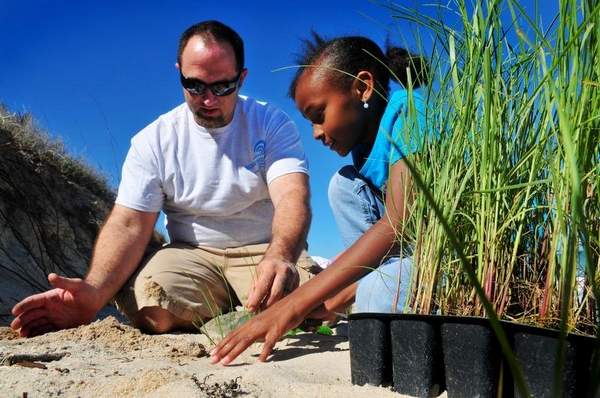Notice of Intent to Award to White Mountain Apache Tribe for Mexican Wolf Support
This agreement is being implemented in order to foster cooperation on a government-to-government basis in Mexican wolf monitoring, management, and recovery to implement the current provisions, and subsequent revisions, of the Final Rule establishing an experimental, non-essential population of Mexican
wolves in Arizona and New Mexico (63 Fed.
Reg.
1752, January 12, 1998), and to provide for implementation of the Tribes Mexican Wolf Management Program, as set forth in the White Mountain Apache Tribe Mexican Wolf Management Plan.
The public benefits through continued partnership and cooperation with the Tribe in terms of Mexican wolf recovery.
Missing from the landscape for more than 30 years, the Mexican wolf can again be seen and heard in the southwestern United States.
Like many species protected by the Endangered Species Act, the Mexican wolf is being restored to the wild to play its role in nature through an ambitious recovery program led by the U. S. Fish and Wildlife Service with significant contributions from several partners, including the White Mountain Apache Tribe.
As set forth in the Statement of Relationship between the Tribe and the Service, the parties have a common interest in promoting healthy ecosystems and have agreed to cooperate on a government-to-government basis.
The Services Indian Policy and Secretarial Order No.
3206 provide that the Service will assist tribes in developing and expanding tribal conservation and management programs, assist tribes in identifying funding sources for fish and wildlife resource management, and pursue intergovernmental agreements to formalize arrangements involving sensitive species.
On January 12, 1998, the Service issued the Final Rule announcing its decision to reintroduce Mexican wolves into the Blue Range Wolf Recovery Area in eastern Arizona, and designated them as an experimental, non-essential population.
The Fort Apache Indian Reservation (Tribe) lies outside, but immediately adjacent to, the western boundary of the wolf recovery area.
The Tribe has the option of allowing or prohibiting wolf re-establishment on the Reservation.
Mexican wolf recovery is a Federal responsibility, and the Tribes participation in wolf recovery activities is voluntary.
In August 1998, the White Mountain Apache Tribal Council passed Resolution No.
08-98-184, which provides for the initiation of a Mexican Wolf Management Program on the Reservation.
The Tribe, in cooperation with the Service, developed the White Mountain Apache Tribe Mexican Wolf Management Plan, which was approved by the Tribal Council on August 3, 200 0. In September 2000, the Tribe and the Service entered into a Cooperative Agreement, FWS Agreement No.
1448-20181-00-J826, which provided for technical assistance and funding to hire and train a wolf biologist.
Reg.
1752, January 12, 1998), and to provide for implementation of the Tribes Mexican Wolf Management Program, as set forth in the White Mountain Apache Tribe Mexican Wolf Management Plan.
The public benefits through continued partnership and cooperation with the Tribe in terms of Mexican wolf recovery.
Missing from the landscape for more than 30 years, the Mexican wolf can again be seen and heard in the southwestern United States.
Like many species protected by the Endangered Species Act, the Mexican wolf is being restored to the wild to play its role in nature through an ambitious recovery program led by the U. S. Fish and Wildlife Service with significant contributions from several partners, including the White Mountain Apache Tribe.
As set forth in the Statement of Relationship between the Tribe and the Service, the parties have a common interest in promoting healthy ecosystems and have agreed to cooperate on a government-to-government basis.
The Services Indian Policy and Secretarial Order No.
3206 provide that the Service will assist tribes in developing and expanding tribal conservation and management programs, assist tribes in identifying funding sources for fish and wildlife resource management, and pursue intergovernmental agreements to formalize arrangements involving sensitive species.
On January 12, 1998, the Service issued the Final Rule announcing its decision to reintroduce Mexican wolves into the Blue Range Wolf Recovery Area in eastern Arizona, and designated them as an experimental, non-essential population.
The Fort Apache Indian Reservation (Tribe) lies outside, but immediately adjacent to, the western boundary of the wolf recovery area.
The Tribe has the option of allowing or prohibiting wolf re-establishment on the Reservation.
Mexican wolf recovery is a Federal responsibility, and the Tribes participation in wolf recovery activities is voluntary.
In August 1998, the White Mountain Apache Tribal Council passed Resolution No.
08-98-184, which provides for the initiation of a Mexican Wolf Management Program on the Reservation.
The Tribe, in cooperation with the Service, developed the White Mountain Apache Tribe Mexican Wolf Management Plan, which was approved by the Tribal Council on August 3, 200 0. In September 2000, the Tribe and the Service entered into a Cooperative Agreement, FWS Agreement No.
1448-20181-00-J826, which provided for technical assistance and funding to hire and train a wolf biologist.
Relevant Nonprofit Program Categories
Obtain Full Opportunity Text:
Not Available
Additional Information of Eligibility:
The objective of this cooperative agreement with the WMAT is to continue to promote recovery of the Mexican wolf (Canis lupus baileyi), a federally listed endangered species.
As set forth in the Statement of Relationship between the WMAT and the Service, the parties have a common interest in promoting healthy ecosystems and have agreed to cooperate on a government-to-government basis.
The Services Indian Policy and Secretarial Order No.
3206 provide that the Service will assist tribes in developing and expanding tribal conservation and management programs, assist tribes in identifying funding sources for fish and wildlife resource management, and pursue intergovernmental agreements to formalize arrangements involving sensitive species.
On January 12, 1998, the Service issued the Final Rule announcing its decision to reintroduce Mexican wolves into the Blue Range Wolf Recovery Area in eastern Arizona, and designated them as an experimental, non-essential population.
The Fort Apache Indian Reservation (Reservation) lies outside, but immediately adjacent to, the western boundary of the wolf recovery area.
The WMAT has the option of allowing or prohibiting wolf re-establishment on the Reservation.
Mexican wolf recovery is a Federal responsibility, and the WMATs participation in wolf recovery activities is voluntary.
In August 1998, the White Mountain Apache Tribal Council passed Resolution No.
08-98-184, which provides for the initiation of a Mexican Wolf Management Program on the Reservation.
The WMAT, in cooperation with the Service, developed the White Mountain Apache Tribe Mexican Wolf Management Plan, which was approved by the Tribal Council on August 3, 2000.
In September 2000, the WMAT and the Service entered into a Cooperative Agreement, FWS Agreement No.
1448-20181-00-J826, which provided for technical assistance and funding to hire and train a wolf biologist.
The Fort Apache Indian Reservation (Reservation) lies outside, but immediately adjacent to, the western boundary of the wolf recovery area.
The WMAT has the option of allowing or prohibiting wolf re-establishment on the Reservation.
Thus, the WMAT is uniquely qualified to perform the activities based on location and property ownership.
Full Opportunity Web Address:
Contact:
Maggie DwireAsst Mexican Wolf Program CoordinatorPhone 505-761-4783
Agency Email Description:
Agency Email:
maggie_dwire@fws.gov
Date Posted:
2011-03-30
Application Due Date:
2011-04-06
Archive Date:
2011-05-06
Saturday April 12, 2025
Social Entrepreneurship
Spotlight
Exploring The Entrepreneurial Mindset – Their Approaches To Tackling Social Change

Jean Case, CEO of the Case Foundation, defines the meaning of social entrepreneurship, and explores the entrepreneurial mindset and approach of social entrepreneurs in dealing with social challenges.

